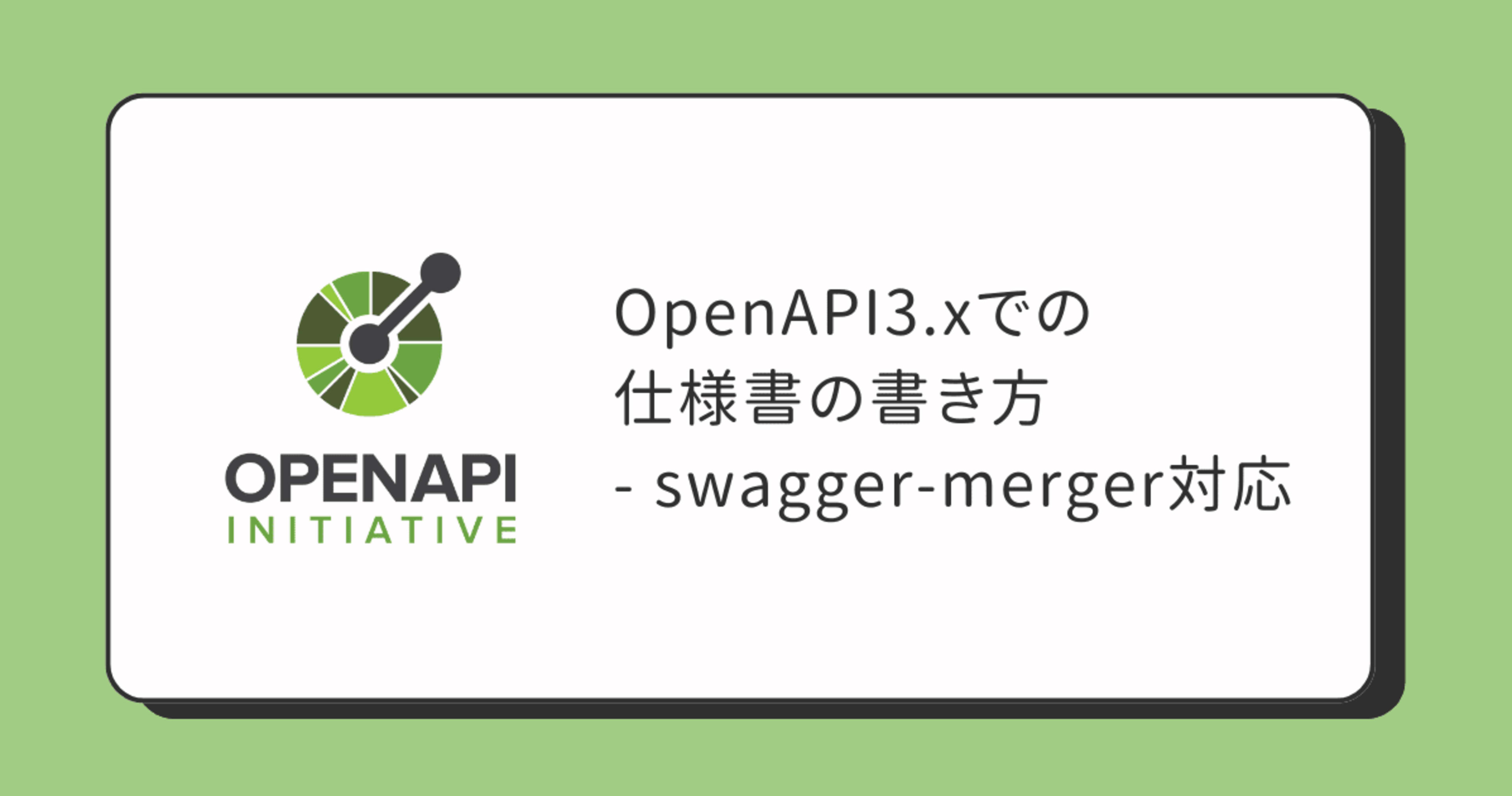
OpenAPI3.xでの仕様書の書き方 - swagger-merger対応
この記事は公開されてから1年以上経過しています。情報が古い可能性がありますので、ご注意ください。
SBJソリューション部のserinaです。
前回、「OpenAPI3.xでの仕様書の書き方」という記事を書いたのですが、
swagger-mergerを使用することになりいざ実行してみたらallOfが使えない!!!
ということで、swagger-merger対応した書き方をまとめます。
バージョン
バージョン: OpenAPI 3.0.3
作成ファイル形式: yml
使用ツール:
- swagger-ui
- swagger merger
作成したパス構造
src/
│
├── paths/
│ └── index.yml
│
├── components
│ ├── examples/
│ │ └── index.yml
│ ├── parameters/
│ │ └── index.yml
│ ├── responses/
│ │ └── index.yml
│ ├── schemas/
│ │ └── index.yml
│ └── index.yml
│
└── index.yml
- paths ... APIの定義ファイルを格納
- components ... componentsの定義ファイルを格納
- examples ... 例の定義ファイルを格納
- parameters ... パラメータの定義ファイルを格納
- responses ... レスポンスの定義ファイルを格納
- schemas ... スキーマの定義ファイルを格納
- index.yml ... 他のファイルを呼び出すメインファイル
書き方
allOfを使用せず$ref参照を使用する
Before
responses:
'500':
allOf:
- $ref: '../../responses/error-response.yml#/error_response_500'
description: 500 Error
After
responses:
'500':
description: 500 Error
content:
application/json:
schema:
$ref: '#/components/schemas/error_response'
examples:
default:
$ref: '#/components/examples/error_response_500'
まず、Beforeの書き方をしても、descriptionは上書きされません。
descriptionや一部を上書きしたい場合は、responsesディレクトリを作成してそこにresponseを定義して呼び出す書き方はできないということになります。
そのため、Afterでは、schemasディレクトリにschemaを定義して上書きしない書き方に変更しています。
さらに、exampleはexampleだとうまく表示されないためexamplesにしてタイトルをdefaultなど任意の値にして、value以降を$ref参照で呼び出します。
exampleのファイルの書き方は、後述で説明しています。
ファイル分割したい場合はそれぞれのディレクトリにindexファイルを作成する
このようにパスを書いていたんですが、これだとうまく認識されません。
responses:
'500':
allOf:
- $ref: '../../responses/error-response.yml#/error_response_500'
description: 500 Error
よって、先頭に # をつけた相対パスで記載するようにします。
ディレクトリごとにindexファイルを作成した書き方にします。
src/components/schemas/index.yml
user:
$ref: './user.yml'
src/components/schemas/user.yml
type: object
properties:
id:
type: integer
name:
type: string
src/components/examples/index.yml
user_example:
$ref: './user_example.yml'
src/components/examples/user_example.yml
value:
id: 1
name: John Doe
src/paths/index.yml
/users:
$ref: './users.yml'
src/paths/users.yml
get:
summary: Get users
description: Retrieve a list of users.
operationId: getUsers
tags:
- Users
responses:
'200':
description: A list of users.
content:
application/json:
schema:
type: array
items:
$ref: '#/components/schemas/user'
examples:
default:
summary: Example user response
value:
- $ref: '#/components/examples/user_example'
'500':
description: 500 Error
content:
application/json:
schema:
$ref: '#/components/schemas/error_response'
examples:
default:
$ref: '#/components/examples/error_response_500_example'
最後に
OpenAPIを作成する際に便利なツールはいくつかありますが、そのツール固有の書き方だったりすると、他でうまく動かないことがあるんだなぁと学びました。
あまり独自の記法を使用せず、このあたりの互換性などもしっかり行ってから作業に入ると手戻りが少なかったなぁ、という反省です。
使いこなせると便利なので、今後もいろいろ試して使えるツールを増やしていきたいです。








